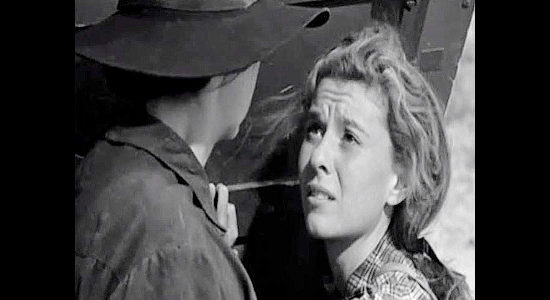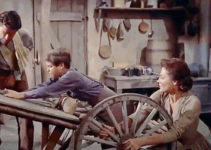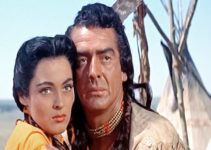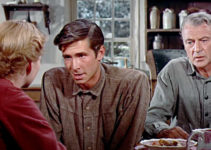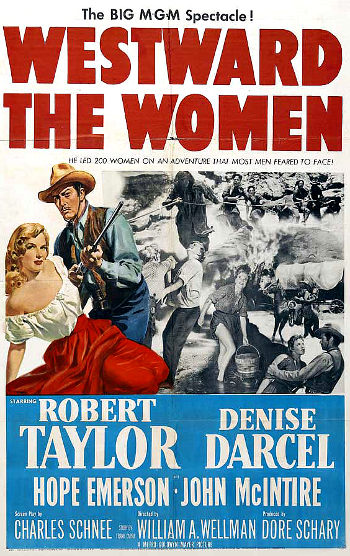 John McIntire is Roy Whitman, a frontiersman who has carved a community in what was the wilds of California. Now he wants to ensure that community outlasts him.
John McIntire is Roy Whitman, a frontiersman who has carved a community in what was the wilds of California. Now he wants to ensure that community outlasts him.
And that means the men who have helped settle the land need wives so families can take root where he has planted his.
Robert Taylor is Buck, a wagon guide he has hired to lead a group of 150 women from Chicago to Whitman’s Valley in California.
Buck takes the job because the pay is good. He has little use for the women themselves and doubts their ability to survive the rigorous journey.
But he’s hired a band of cowboys to help with the journey under one condition; they keep their distance from the women.
Of course, not all the men can abide by that rule. Buck chases off one cowboy who doesn’t; then has to kill a second.
That prompts most of the other men to abandon the wagon train. Buck’s ready to turn back. The women — led by the towering Hope Emerson as Patience — won’t let him, and prove worthy of even Buck’s respect by the end of the trip West.
And one particularly pretty and troublesome female — Denise Darcel as former dance hall girl Fifi Danon — might even change Buck’s thinking about women in another way.
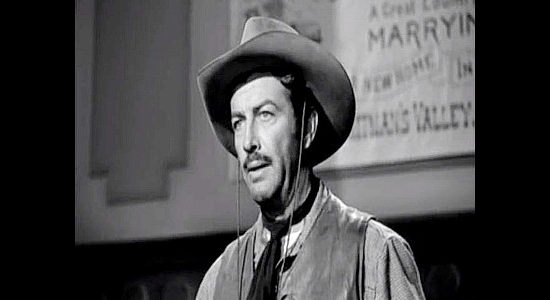
Robert Taylor as Buck Wyatt, warning the 150 women of the dangers they’re about to face in Westward the Women (1951)
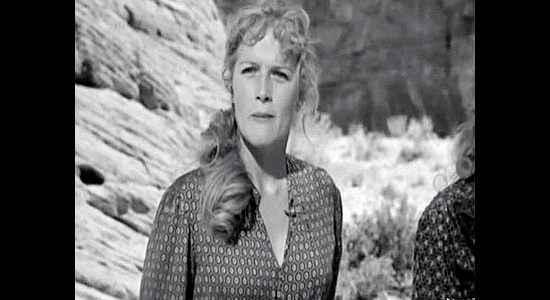
Denise Darcel as Fifi Danon, upset because she’s somehow caused trouble again for the wagon train in Westward the Women (1951)
The film has its origins in a story by none other than Frank Capra. Shame he wasn’t behind the camera. The result might have been much better.
Instead, viewers are left with a wagon train enduring all the by-now expected trials and tribulations, except with a nearly all female passenger list. A flash flood washes away one wagon. Another crashes on a trek down a mountain. The Indians attack, claiming more lives. Then there’s the crossing of the desert.
And there are a couple of ridiculously silly scenes. A character named Rose is walking across the desert. Until she collapses. What’s that? She’s about to give birth. Well, at least that’s courageous in a film that’s supposed to be all about female fortitude.
Much more ill-fitting is the scene where Darcel — a former French beauty queen trying to pull off a very non-glamorous role — and Taylor finally admit their attraction to one another.
She’s fired her gun at a rabbit, nearly sparking a stampede. Angered, he cracks his bull whip in her direction, eventually grazing her bottom. Mad, she hops on a horse and rides off. He rides after her, catches her, then slaps her across the face twice, drawing blood. Then they wind up in one another’s arms.
They share a horse on a ride back to the wagon train. She professes her love for him, asking Buck to do the same. His response: Put your head back where it belongs. Meaning on his shoulder. Wow. Has a more chauvinistic scene ever graced a Western that’s supposed to be a testament to the strength of women?
Helping salvage the film is a solid performance by Hope Emerson, the presence of Henry Nakamura, who provides comic relief in the role of a cook known as “Ito,” and a neat ending in which the woman select their mates rather than vice versa.
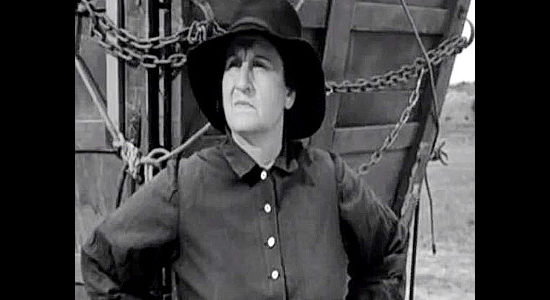
Hope Emerson as Patience Hawley, ready to do work equal to any man during the trek West in Westward the Women (1951)
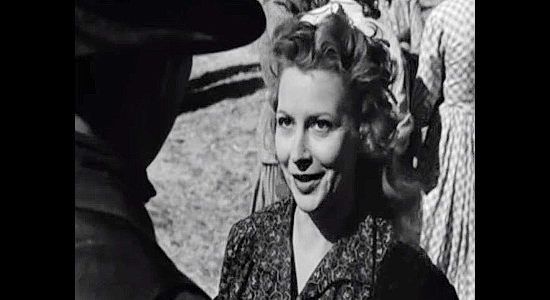
Julie Bishop as Laurie Smith, turning down a womanizing cowpoke who asks for a dance in Westward the Women (1951)
Directed by:
William Wellman
Cast:
Robert Taylor … Buck
Denise Darcell … Danon
Hope Emerson … Patience
John McIntire … Roy Whitman
Marilyn Erskine … Jean
Lenore Longergan … Maggie
Beverly Dennis … Rose
Julie Bishop … Laurie
Henry Nakamura … Ito
Renasta Vanni … Mrs. Moroni
Runtime: 118 min.
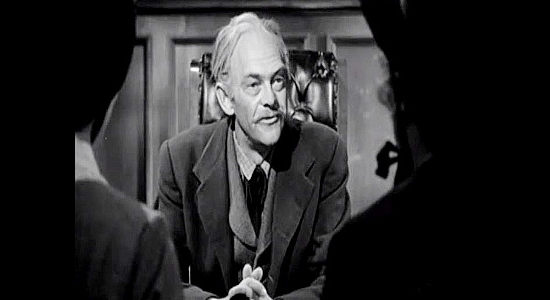
John McEntire as Roy E. Whitman, reviewing two applicants hoping to travel West to marry in his valley in Westward the Women (1951)
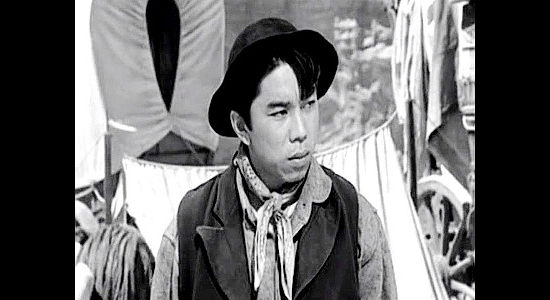
Henry Nakamura as Ito Kentaro, the cook on the trip West, convinced Buck Wyatt is driving the women too hard in Westward the Women (1951)
Memorable lines:
Buck to Whitman: “There are two things in this world that scare me, and a good women is both. Take a load of good woman across hell? Not me.”
Roy Whitman to Buck: “See, you overlooked one thing.”
Buck: “What’s that?”
Roy: “The will of a women when there’s a wedding ring in sight.”
Ito: “I say you wrong, big boss. You drive too hard. No man do what these ladies do. And this lady Dannon, she do two, maybe three times more.”
Buck Wyatt: “Don’t you tell me I’m wrong. Even if I am.”
Ito: “When you’re wrong, big boss, I tell you.”
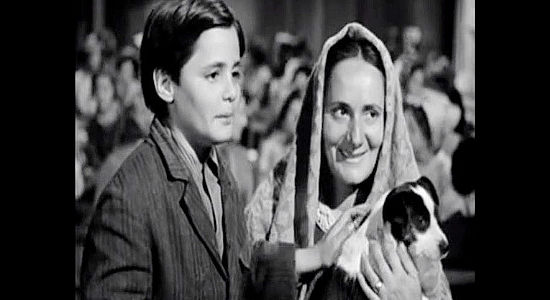
Guido Martufi as Anthony Moroni, ready for the trip West with his mother (Renata Vanni) and his puppy in Westward the Women (1951)
Danon, touching her six-shooter, insisting the women get a chance to make themselves presentable before meeting their potential husbands: “If the men come near us before we’re ready, they’ll never go back.”
Patience, as the trip nears its end: “There’s a freshening breeze. And I smell man ahead!”
Patience, to the men, once the women have reached their destination: “You can look us over, but don’t think you’re going to do the choosing. All the way from Independence, I’ve been staring at two things. One was this picture, and the other was the rump of a mule. And don’t ask me which one was prettier.”
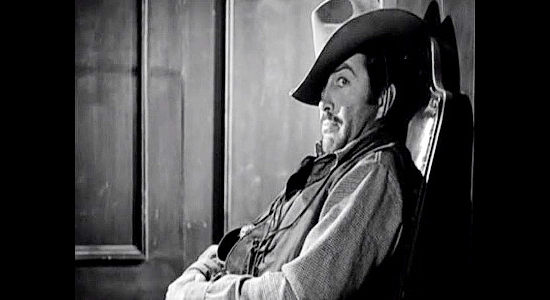
Robert Taylor as Buck Wyatt, humored by some of the women hoping to be part of the wagon train West in Westward the Women (1951)
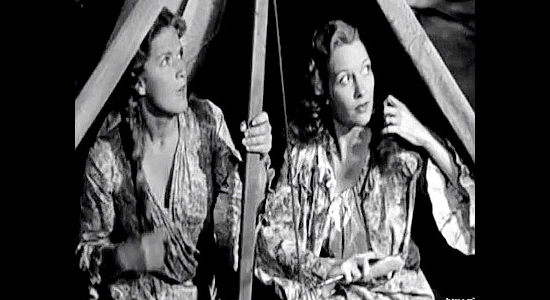
Denise Darcel as Fifi Danon and Julie Bishop as Laurie Smith, startled by an approaching storm in Westward the Women (1951)
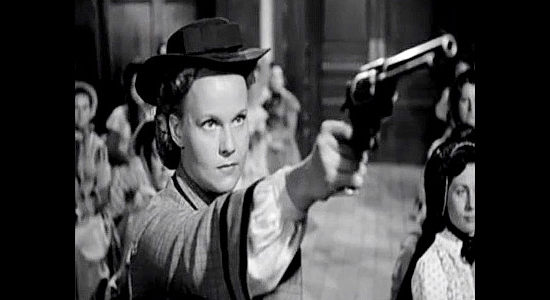
Marilyn Erkskine as Jean Johnson, demonstrating her shooting skills for Buck Wyatt in Westward the Women (1951)
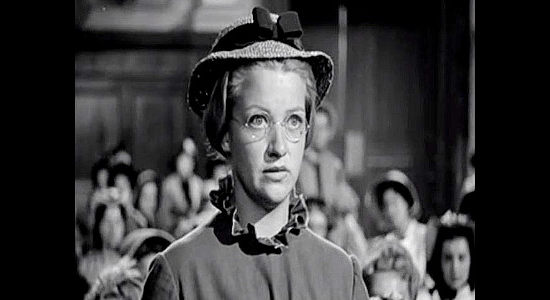
Lenore Lonergan as Maggie O’Malley, one of the women most prepared for the hazards of the trip ahead in Westward the Women (1951)
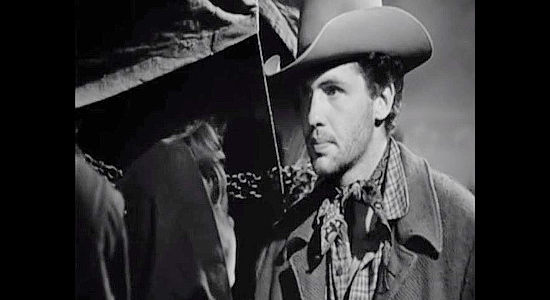
Pat Conway as Sid Cutler, a cowboy smitten by Rose and trying to decide whether to stay with the wagon train in Westward the Women (1951)
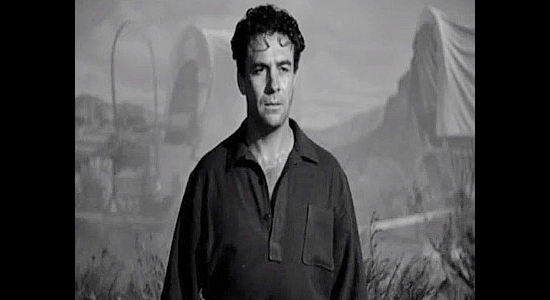
Bruce Cowling as Cat, one of Wyatt’s men who just couldn’t heed his warning to stay away from the women in Westward the Women (1951)
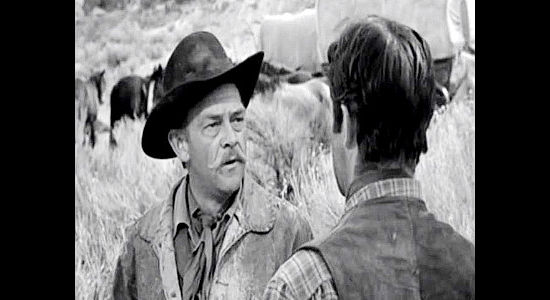
John McIntire as Roy E. Whitman, the man who came up with the idea of recruiting 150 women to take back to his California valley in Westward the Women (1951)
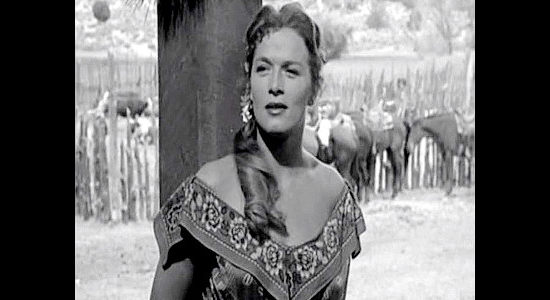
Denise Darcel as Fifi Danon, all dressed up and ready to pick a partner after the difficult journey West in Westward the Women (1951)
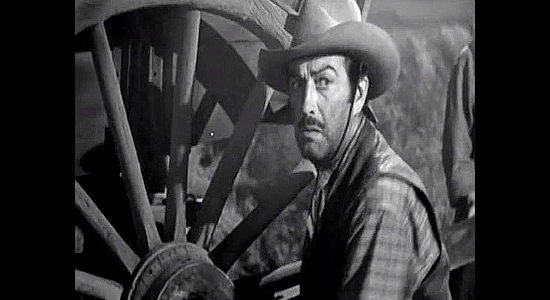
Robert Taylor as Buck Wyatt, reacting to the sound of a desperate call for help in Westward the Women (1951)

